Technical Guide | Teach you how to build a commercial DAO without a bank
Original title: How to create a bankless DAO
Translation: Frau Yang Emma
Proofreading: Samuel
Translation agency: DAOSquare
- LikeCoin wait 21 days to cancel the delegation? Talk about Cosmos's proof of bound equity BPoS
- Bitcoin Technology Weekly: Statechain, Schnorr signature and BIP322
- Technical Guide | IPFS Relationship Genealogy, Technical Framework and Working Principle
Learn how to use OpenLaw to encapsulate classes, and use MolochDAO to create a bank-free organization
Dear crypto natives,
Organization is a collection of contracts .
Modern organizations such as companies and non-profit organizations are all established in the legal system . The legal system is maintained by the state. The cost of maintaining the nation-state is very expensive , it is easy to cause corruption, it will be subject to geographical restrictions, non-digital, and requires monopoly violence to implement.
Nevertheless, as long as the national legal system can avoid dysfunction and corruption, it is still a useful settlement layer for human beings. For example, the United States has strong property laws and company laws, and the environment in the United States is stable enough to assume that its laws are enforced under reasonable and neutral circumstances.
However, a new settlement layer has now emerged. It is called Ethereum and has a property rights system, a settlement layer and a currency system -it is a new social coordination tool provided to the world.
Although Ethereum is not as flexible as the national legal system (for example, it cannot make corresponding decisions without the help of human judgment), but it also has other advantages-digitization, which can be programmed and does not require jurisdiction , And available to all Internet citizens. Ethereum ’s operating rules are also transparent and highly efficient—no army, bank or bureaucracy is required. In addition, if we combine the advantages of the legal settlement system with the advantages of the digital settlement system, what will happen? Can we build an organization that spans two worlds? This is our strategy today.
We will create a DAO that spans two areas.
We will summon a programmable, extensible, globally accessible digital entity for $ 4, which contains legal documents, bank accounts, and funds coordination tools.
This is enough to shock you.
—— RSA
Tuesday's goals:
Strategy # 31: How to create a DAO without a bank
Today, we will use the OpenLaw smart protocol to create a DAO using Ethereum without a bank. The DAO contains a basic legal encapsulation procedure, which is useful for joint ventures with co-founders at the planning stage. It includes a behavioral method that can be used to designate founders, use Ethereum or stablecoins to pool funds, and use DAO shareholders to vote for future resolutions.
Goal: Deploy DAO to Ethereum using founding protocol
Skills: Intermediate
Time to pay: 30 minutes
Return on investment: A digital company that can be accessed globally, the transaction fee is only $ 4-not bad
How to use OpenLaw to create a DAO without a bank
Guest article: OpenLaw team, creator of OpenLaw Public Library
Ethereum is challenging some common assumptions, for example, about how currencies work. It has become a leading platform for publishing digital and financial products (or even systems), and is completely operated with code.
Similarly, it is also becoming a launch pad for digital organizations or DAOs, which will benefit from these emerging financial products. How to better organize themselves in an increasingly digital market, such traditional ideas are being challenged.
But what exactly are DAOs and how do they relate to financial products that do not require banks?
Organization is a contract (so is DAO)
We repeat an old idea here: organization is a contract. Through expansion, DAO is actually a collection of contracts; however, it includes both traditional and digital ones. These contracts are designed to enable online communities to coordinate and exchange digital currencies and assets to accelerate social or business activities (for example, DeFi allows people who do not have a bank account to make deposits).
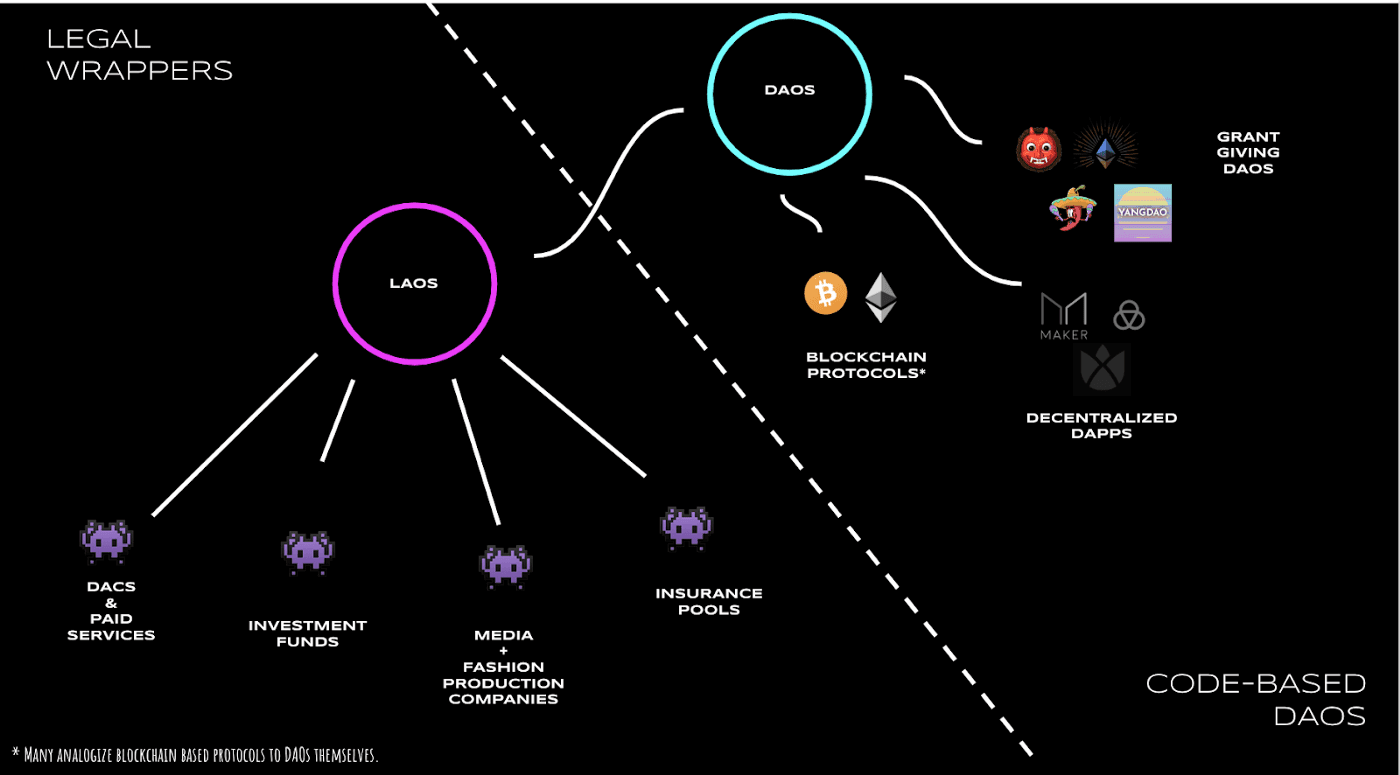
If you are familiar with the public stock market, you may see a link to " Organization Documents " on the company's website. As its name suggests, it clarifies the rules of the company and its financial operations. From this core, the company may develop layers of legal commitments, thereby forming a network or "contract set" that defines it.
Therefore, by consulting a series of legal agreements, one can quickly grasp the existence of the organization and understand how to program the organization to operate in the future. For legal engineers, this may not be surprising, but the entire relevance theory relies on a programming language such as Solidity ( Ethereum 's programming language), which can reflect legal agreements under computable conditions so that it can be used without In the case of banks, transfer funds and update other legal status. The legal agreement written in Solidity defines the rights and other rights between digital accounts, which is not closely related to the DAO field.
DAO legal package
With the recent upgrade of the OpenLaw public library (available for free via email account), we have more access to the Ethereum, financial programming and DAO fields than ever before, anyone can easily upgrade their organization, other legal after the upgrade Benefits can be converted into self-executing smart contract code. We call these smart protocols. (RSA-we use the OpenLaw smart protocol to tokenize ourselves in Tactic # 19 )
In the most fundamental sense, the smart protocol acts as a bridge between the potential autonomous code in the smart contract and its interacting personnel, integrating the code and the law.
For example, a traditional payment invoice in the form of web2 is just a string of text, and one bank employee instructs another bank to update your account. On the other hand, a smart invoice only requires employers to sign a USDC or DAI stablecoin payment slip on their browser wallet, so that digital records can be created and settled within a few minutes. Bank instructions took several days.
Are you excited? Now imagine that this speed and predictability apply to all payment methods of all legal contracts without the need for banks, and all other organizational operations that can be similarly simplified.
Let's build DAO together
In order to allow more people to access Ethereum ’s operational basic types of smart regulatory protocols, such as “DAO” and other experimental digital associations, the OpenLaw team has written and synthesized a set of fast local codes / local regulatory formats for the bankless community to Let's test and start running-so, let's build DAO together!
Use Cases
We will launch DAO when most entities start, namely: the planning phase.
Suppose you have a group of founders who want to invest in the establishment of a business-applications, consulting services, game tribes, podcasts, capital pools-this smart protocol is the origin of capital raising and guiding capital-and the weighted voting of subsequent steps Origin-no bank involvement during this period!
The following are the steps of the "Smart Founder Agreement" created for the initial company:
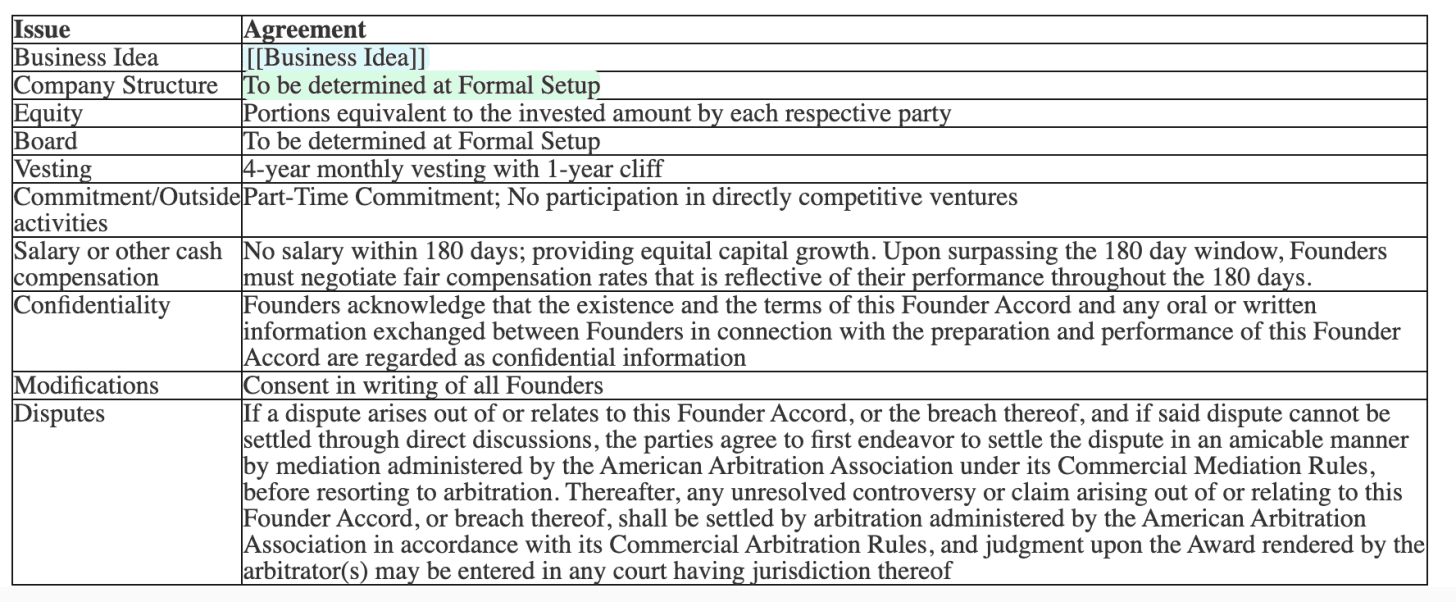
Step 1: Create an OpenLaw account
Create an OpenLaw account and log in . (RSA-If necessary, please use a private mailbox !)
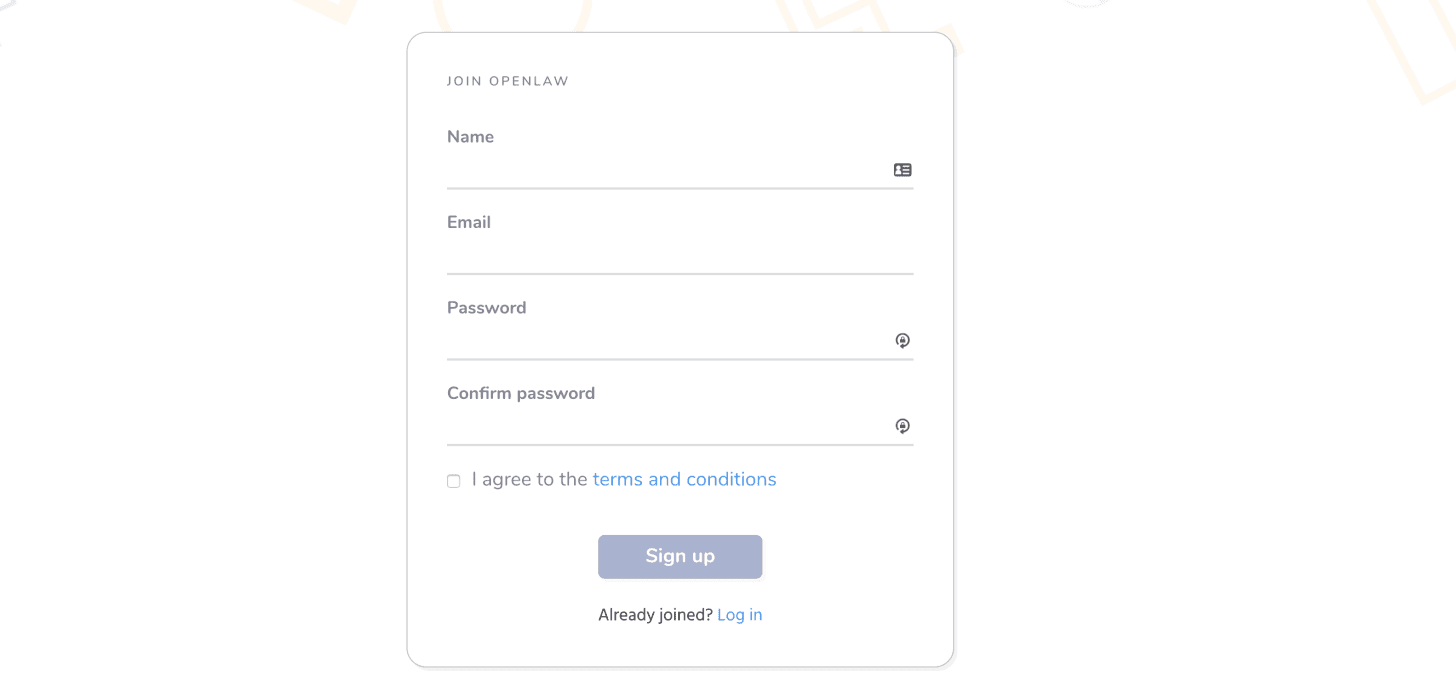
Step 2: Fill in the founder agreement details and send to the co-founder
Click here on the Smart Founder Agreement and fill in the details.
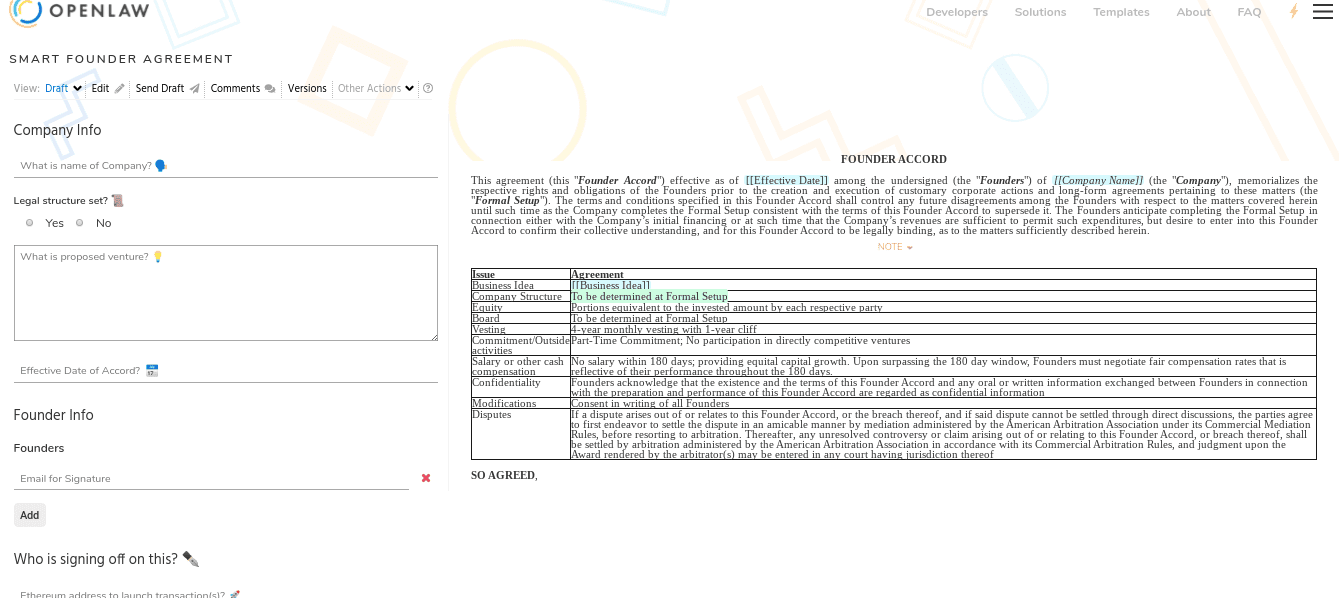
In Ethereum, basic templates can be used by any organization to establish a new business. These templates can record the founder ’s plan, and deploy code and hold funds when determining business goals. To this end, anyone can fill in the smart founder template in the OpenLaw library, execute basic founder agreements, establish terms for new businesses, and deploy related Moloch DAO ( some examples ) to be in Dai (default) or any other ERC -20 token for financial operations.
Fill in the details including:
- Company Name (name of entity) Company Name (name of entity)
- Legal structure set (mark “no” to determine later otherwise select a type) Legal structure set (select “no” for future determination, or select a type)
- Proposed venture (describe the business in general terms) Proposed venture (describe the business in general terms)
- Effective Date of Accord (agreement date) Effective Date of Agreement (Agreement Date)
- Founders (all founder emails—they'll all need OpenLaw logins + ETH address) Founders (all founder emails—have OpenLaw login name and ETH address)
- Who is signing off for this? (Enter your ETH address to hold this contract) Signer (enter your ETH address to hold this contract)
Click "Send Contract" on the top menu and send it to the creator's email, signing with his ETH address. Once signed by all parties, DAO can be deployed to the Ethereum mainnet.
Step 3: Deploy DAO to the Ethereum mainnet
After you sign with other co-founders, you can execute smart contracts and deploy to the mainnet. Click "Execute" to deploy the contract and convene the DAO.

Calling DAO burns money, because the ETH contract is far from being completed, it costs 6.5 million gas, and the contract is converted to $ 4 at the standard gas rate of 3.5 gwei. But think about it, you just convened a globally accessible digital company with legal documents, bank accounts, and funds coordination tools!
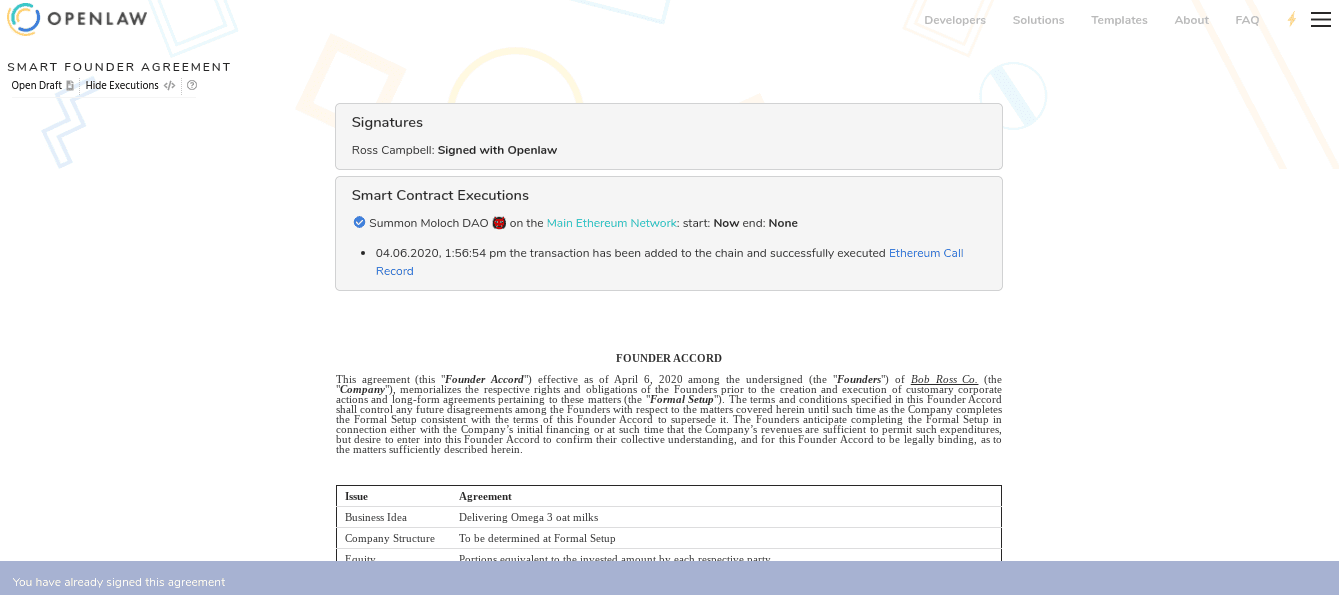
👉 This is the display of the organization you deployed in the code
Step 4: Voting on the proposal and adding a contract
The final Moloch DAO has a basic dapp interface , can vote and propose proposals on verified smart contracts, move funds between the founder and business partners, which can be seen in the deployment on the etherscan 'browser' , You can also use Ethereum to trade between DAO members. (The OpenLaw team will soon provide business intelligence dashboards and similar interfaces, which makes it easier for these companies to fix on Ethereum.)
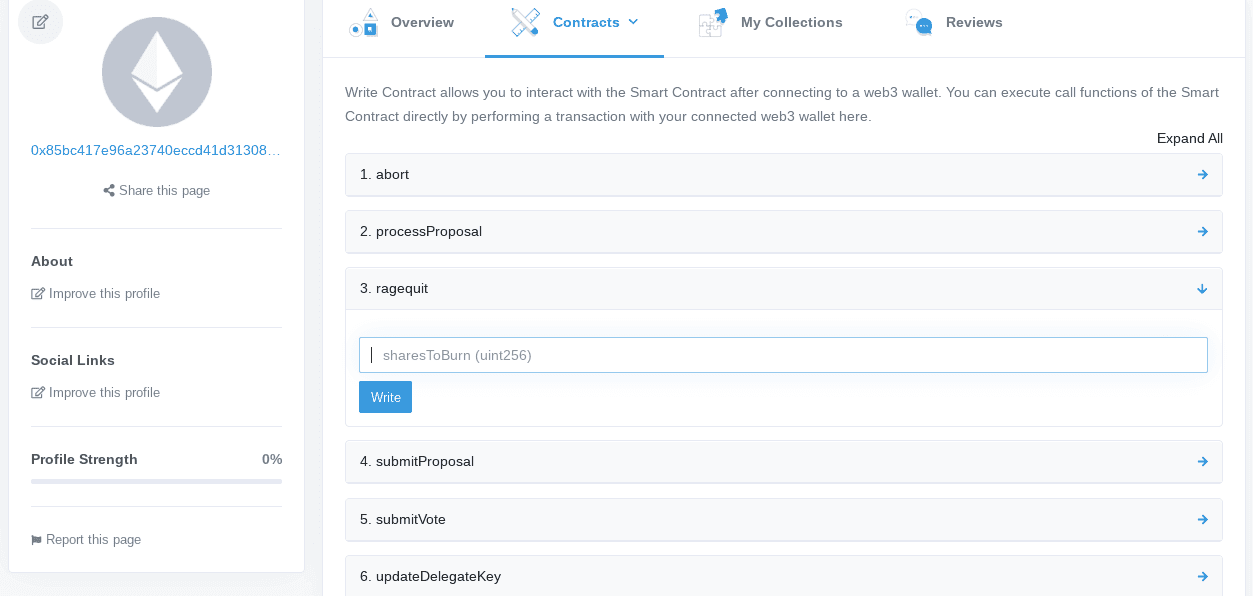
The OpenLaw markup language can also quickly convert the legal encapsulation type to Moloch DAO function, or it can be converted to almost all DAO or Ethereum operations related to this, as shown in the following simple form, submit a voting proposal with an electronic signature statement ( here Generate Ethereum transactions):
👉This is the form to submit DAO fund application
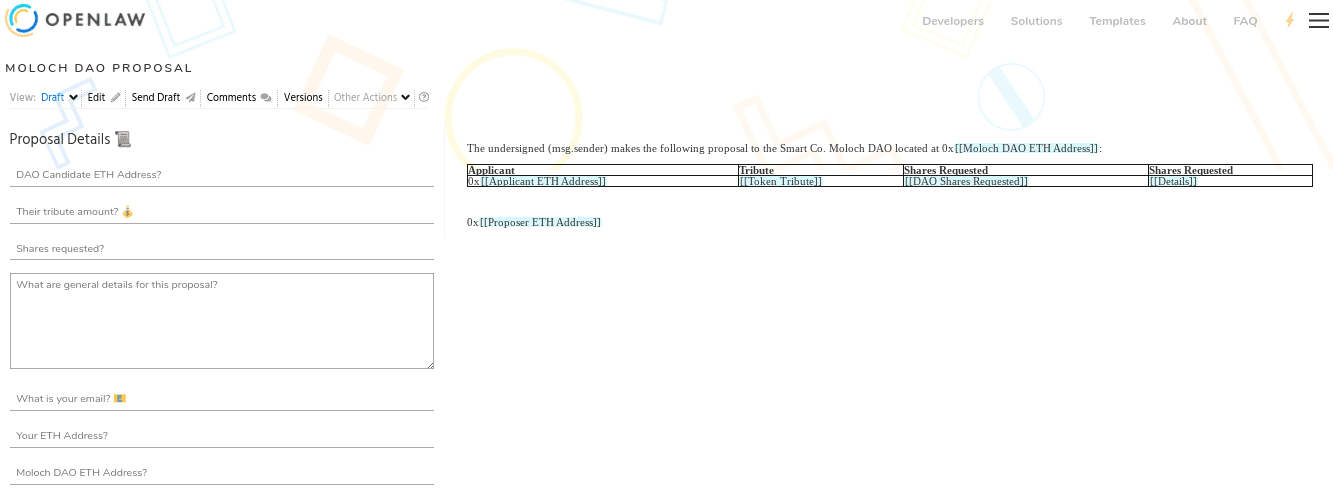
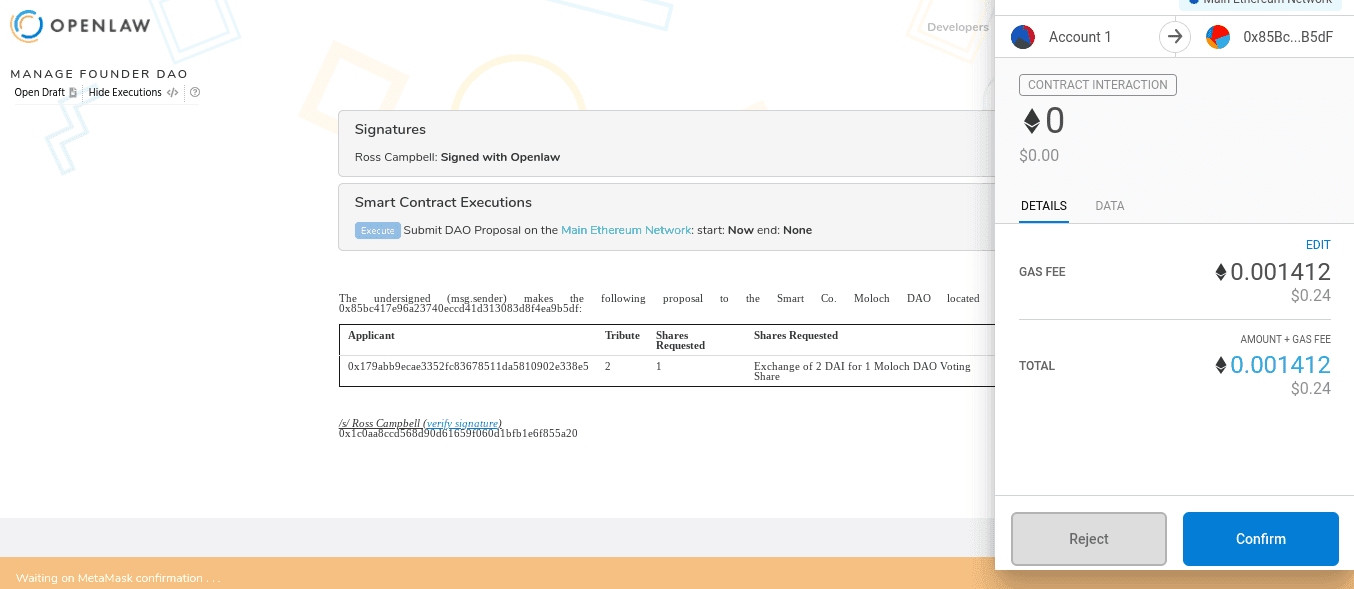
In addition, before the vote is recorded in Ethereum, the founder's decision can be programmed through the OpenLaw form, which requires legal description, electronic signature records, and stakeholder approval:
👉 This is a form for voting on capital construction funding applications
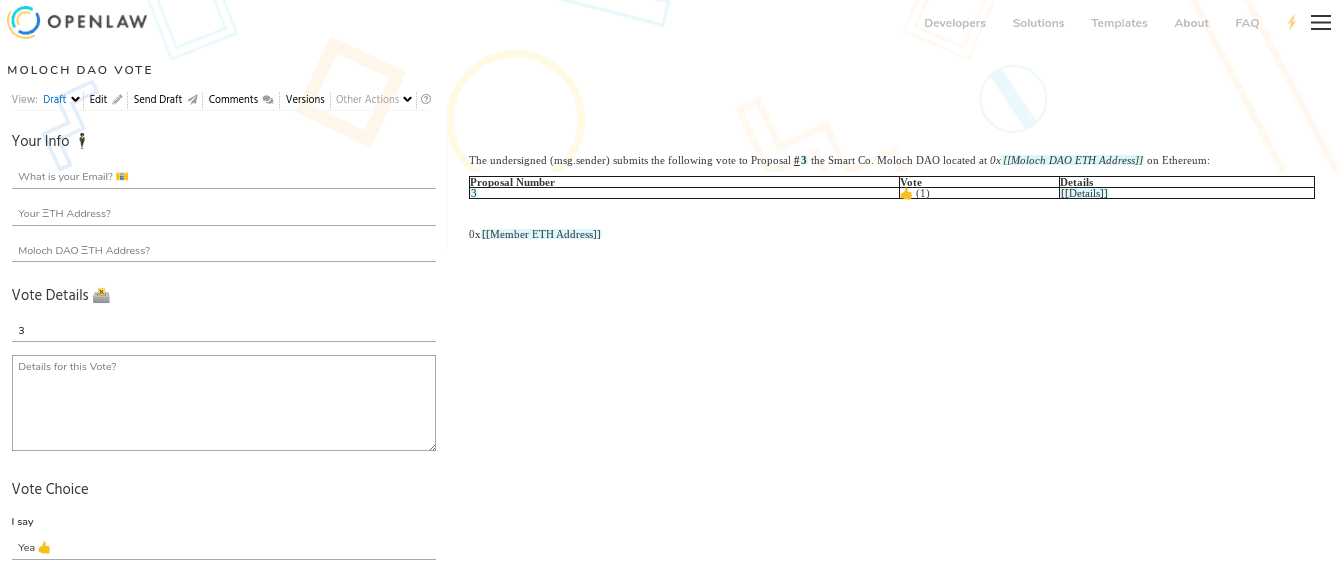
The founder can use his ETH account signature to vote on the proposal.
With the help of these bankless starter tools on Ethereum, new companies or groups of developers seeking funding can easily make collective decisions based on nodes based on the simple Moloch DAO program and the founder agreement stored on OpenLaw (this Let DAO also have a matching stamp in the OpenLaw database). Since then, more complex legal and digital procedures may be required, and the Openlaw and The LAO teams are continuously working to build legal templates and financial support to fund these organizations that rely on smart contracts for survival and development.
Is it cool?
Now that you have unlocked a new skill, you can now convene a globally accessible digital capital coordination tool. The bankless organization is currently a new LEGO that has just come out, and this is just the beginning.
Yes, DeFi will give you super powers.
Other steps
- Have an idea, find some founders and create DAO together!
- Enter LAOtelegram and OpenLaw public resource library
No bank organization , $ 12 / month, file access , internal circles and transactions- ( virtual currency payment )
Non-financial or tax advice. This newsletter is for educational purposes only. It is not an investment recommendation, nor is it a recommendation to buy or sell any assets, nor a financial recommendation. This press release is not a tax recommendation. You can talk to an accountant and make your own research.
We will continue to update Blocking; if you have any questions or suggestions, please contact us!
Was this article helpful?
93 out of 132 found this helpful
Related articles
- Technical Primer | GHAST Rule Upgrade (Part 1)
- Why is Filecoin different? IPFS founder talks about its proof system
- Technical direction: Bandwidth optimization in transaction forwarding (1)
- Viewpoint 丨 Ethereum 2.0 technology sharing
- Analysis of Cosmos cross-chain solution
- Technical Perspective | How easy is it to implement BTC double payment with the RBF protocol?
- Dry Goods | Basic Principles of Chainlink Predictor
